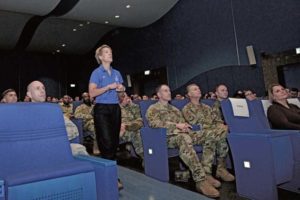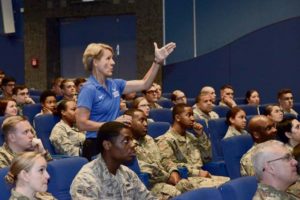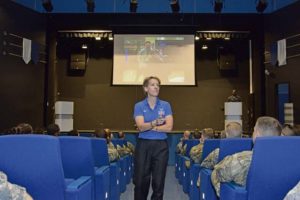
Four years after narrowly surviving a helicopter crash, retired U.S. Air Force Col. Laurel “Buff” Burkel returned to Germany to share her story with members of the 86th Airlift Wing at the Hercules Theater, Oct. 18.
An audience of 160 listened intently as Burkel recounted her recovery and the many obstacles she faced after the Royal Air Force Puma helicopter she was in went down over Afghanistan Oct. 11, 2015. The accident left her with a broken neck and the loss of five team members, including U.S. Air Force Maj. Phyllis Pelky and Master Sgt. Greg Kuhse.
After the accident, Burkel was transported by a C-17 Globemaster III aircraft to Landstuhl Regional Medical Center, to receive specialized medical care.
“Four years ago I was here,” said Burkel. “I was sitting there with a collar on so I literally would not die, waiting to have surgery to have a halo put on my head on the following Tuesday. Coming back at this time of year, in particular, is even more powerful for me.”
Burkel’s path to recovery was long and arduous, but her determination and the support of family, friends, and fellow Airmen around her gave her the strength she needed to make a full recovery and return to flying status.
A later testament to her successful recovery was the climb that she and her close friends made to the summit of Mount Kilimanjaro to celebrate her retirement from the Air Force.
“There are a lot of people that are part of my story from the beginning of it,” said Burkel. “And the reason I’m literally here today is because of all of those connections that I have. It’s important. Resilience — and that’s a lot of what we have been talking about in the Air Force over the last few months — is not an individual sport.”

Burkel stressed the importance of connectedness and helping each other to be resilient in the face of adversity.
In her time of need, much of the help Burkel received was through the Air Force Wounded Warrior Program. The mission of the AFW2 is to provide well-coordinated, personalized support and advocacy to each wounded, ill, and injured service member, as well as their families and caregivers.
“She’s not afraid to reach out to somebody, and we shouldn’t be either,” said Senior Master Sgt. David Maurice, U.S. Air Forces in Europe Intelligence functional manager, who has known Burkel for the last 19 years. The two met while part of the same airlift squadron at Dyess Air Force Base, Texas. “Even when you think you’re okay, there might be times where you’re hurting afterwards. Keep reaching out.”
As an Ambassador for the AFW2, Burkel said she learned how to tell her story and help other Airmen to tell their stories in an effort to raise awareness that the program exists, inspire others to get the help they may need, and to understand the support that is available to them.
“It’s for us Airmen: civilians, active duty, Guard, and Reserve. It’s for us to take care of each other,” said Burkel.

Burkel said one of the main things she wants everyone to take away from her story is that “resilience is not an individual sport.”
“Be there for each other,” said Burkel. “Regardless of rank. Regardless of position. Know each other well enough to be there for each other; to celebrate the good, and weather the bad.”


